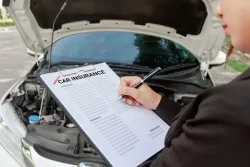How To Make a Successful Water Leak Insurance Claim.
Water is one of the most destructive forces in nature. It can cause a lot of damage to your home, and make it unlivable. Also, you never know when a water leak will happen, and it can be a costly problem.
The cost of water leak insurance is not too expensive, but it is important to know how much you are paying for the coverage.
Water leaks can be very costly if you don’t have insurance. This is why many homeowners opt for water leak insurance in their homes.
In this article, I’ll be sharing with you 8ways to make a successful water leak insurance claim. But before that, let’s define what water leak insurance is, the causes, the types, how much it costs etc.
What is Water Leak Insurance?
Water leaks can have a devastating effect on your home, and the cost of repairing them can be incredibly expensive.
A water leak insurance policy is an excellent way to protect your home from the financial impact of a potential water leak. A water leak insurance policy covers the costs of unexpected water damage that arises from a leak or burst pipe.
Water leak insurance policies cover the cost of replacing water-damaged items, such as carpets and drywall. These policies also cover the cost of hiring a plumber for repairs. Water leak insurance policies typically provide coverage for three to five years, depending on your needs and policy.
The coverage for water leaks varies depending on the type of policy you purchase. Some policies will cover damages caused by flooding, while others will only cover damages caused by burst pipes. The best way to find out if you need a water leak insurance policy is to contact your agent and ask them about what types of coverage they offer.
What causes a Water Leak?
One of the major causes of water leaks is the leakage of various plumbing systems, fixtures, and fittings in your home. Understanding and keeping an eye out for typical circumstances that lead to leak development is one of the greatest methods to safeguard your property from future leaks.
Here are 4 major causes of water leaks;
1. Obstructions in the Pipes:
The majority of homes frequently experience clogged waste pipes, toilets, sinks, and showers. At some point, hair, food, grease, toilet paper, and occasionally children’s toys, etc. have all been found guilty, but the results are generally the same. Sinks, fixtures, toilets, and other appliances start to flow more slowly and eventually leak or overflow, creating major issues.
Before anything else, it’s crucial to pinpoint the exact location of the leak, which is why it’s so important to contact a water leaks expert.
Unclogging pipes and drains can be difficult work, but with a little know-how or expert assistance, you should be able to fix these types of leaks before further damage is done. In order to prevent a major issue, it is necessary that you clean your drains.
2. Pipeline damage
The pipes naturally begin to corrode and decay after so many years of use, eventually leading to cracks and crevices that discharge varied amounts of water. Additionally, joints in your plumbing may become loose or separate due to the natural shifting of your home’s framing or foundation, leading to water leaks.
There may be only one or two drops per minute, or there may be a steady stream of water leaking. If the leak is not found and fixed in a timely manner, all that water will eventually have to go somewhere and could cause harm. The difficult element of finding a leak is why video line inspection is now so crucial.
3. Water heaters have rust and sediment.
Another frequent location for water leakage is the plumbing that enters and exits a water heater. Rust, wear, and sediment buildup inside aged tanks are frequently the root causes of these leaks. The majority of water heaters contain multiple filters and valves that can become “clogged,” leading to leaks in the plumbing. To fully identify and address this major problem, expert assistance is needed.
4. Plumbing external leaks
Even while leaks may occur outside of your property, they still constitute leaks and can cost you money in the form of water bills and repairs.
The sewage and plumbing pipes leaving your home deteriorate with time, resulting in minor steam leaks, which draw roots to develop there. In fact, when the roots cause even worse clogs and leaks, the water pressure is seriously affected, and your monthly bill for water use goes up.
Types of Water Leaks Covered by Insurance?
First of all, it is important to understand what home insurance covers when it comes to water leaks. In general, damage caused by a leak or an overflow of a sanitary installation as well as those caused by a break in a public water pipe is covered by basic home insurance.
Homeowners’ insurance frequently covers the following for water leaks:
Broken pipes: This might involve a frozen pipe that breaks, but not if you failed to maintain a sufficient level of heating in the house.
Unintentional leaks: such as plumbing leaks or appliance leaks from a damaged dishwasher or washing machine.
Water damage: that results from a fire that was put out using water from a sprinkler system or a fire department hose.
Roof leaks: damage from a storm or a tree falling on your roof, as well as water damage from a roof leak.
Remember that you will need to repair any damage to your roof that results from an accident (like a tree that has fallen) quickly. If you don’t, you risk sustaining additional water damage that won’t be reimbursed.
Storm-related water damage caused by hail or torrential rain.
Ice dams, like ice that accumulates in your gutters and affects your home, might be covered as long as the damage was unexpected and wasn’t the result of poor maintenance.
Types of Water Leaks not Covered by Insurance?
In general, insurers provide a wide range of coverages, but there are a number of exclusions and limitations, so you must determine which coverages you need to purchase.
1. Lack of proper maintenance: Home insurance claim would not cover you, if you had a leaky faucet and did not fix it, leading to major water leaks later.
2. Pipe bursts: If a pipe breaks as a result of gradual wear, insurance wouldn’t pay for the water leaks.
3. Mould and Rotting: Water leaks in your home that cause mould, rotting, or corrosion are not covered.
4. Foundation Seepage: Your standard insurance does not cover damage caused by water entering your property through a break in the foundation.
5. Roof damage: You would be covered for both the roof repairs and the water damage if a tree fell on your roof and allowed water to enter. However, any further damages, such as mould, would probably not be covered.
Regardless of your coverage limitations or the type of policy you have, almost all homeowner’s insurance policies do not cover wear and tear or gradual deterioration. Some insurance plans, nevertheless, might be able to pay for gradual damage.
In this regard, it is necessary to assess the types of coverage that should be contracted or not, as well as their inclusions. Consulting with a knowledgeable advisor and weighing your options will help you decide on the best course of action.
What is the Cost of Water Leak Insurance?
One of the most frequent and expensive categories of homeowner insurance claims is water damage (including damage from freezing). According to the Insurance Information Institute, 29% of all homeowner insurance claims are made as a result of water damage or freezing each year by around one in 50 households. An insurance claim for freezing or water damage generally costs $11,098.
How to Make a Successful Water Leak Insurance Claim
Water leak insurance claims are a sensitive issue. You need to be careful with how you go about it, or else you might end up paying more than you should have. This article will provide you with 8 ways to make a successful water leak insurance claim.
By following these 8 steps, you will be sure to cover all the important elements and facilitate the process of compensation on the side of your insurer. Here’s what to do to file a home insurance claim if a water leak/damage is wreaking havoc on your home:
1. Report the claim immediately.
In accordance with the essential procedures for a home insurance claim, you are required to notify your insurer of the water leak as soon as possible. This is also applicable to all other types of claims.
Before you incur any charges, the insurance agent who handles your claim will be able to confirm the coverages outlined in your house insurance policy. This will give them enough time to investigate what happened and tell you what to do next.
2. Prevent the leak from getting worse.
It is up to you to prevent the leak from getting worse by keeping it under control. But not to repair it until the insurance company or their loss adjuster has analyzed the issue. Here are 4 steps to help limit the effect;
Pipe breakage: Turn off the water temporarily or block the troublesome water supply lines. To prevent short circuits and the risk of electrocution, make sure to turn off the electrical if the water leak is severe.
Leak from a pipe: To prevent further damage, the leak must be identified. Try to identify these signs to locate where the leakage is coming from.
For example traces of mould, bad smells, clogged gutters, cracks in the foundation, crumbled brick joints, high humidity, etc.
If you are not able to stop the leak, remove valuable items from the leaking area immediately, both the expensive ones and the inexpensive ones.
If you are not able to move large furniture (such as sofas, cupboards, dressers, etc.), try lifting it such that the water doesn’t get any closer to or further away from the item in question. It will be made easier to recover this furniture.
3. Inform the third parties involved immediately
It is crucial to inform any third parties involved in the water leakage situation (such as the municipality or a neighbour) so that they can take early action to reduce the damage on their end.
To maintain your right of remedy, send a formal notice to the city within the allotted time frame if the damage was brought on by a public infrastructure failure. The town will also be able to arrange the necessary maintenance or work to address the issue. If necessary, it might also be able to dispatch an emergency crew to the scene to deal with the problem.
If you are a tenant: Inform your landlord as soon as you can, and work out a plan with him for who would inform the other occupants of the building.
Co-owners: Please inform your co-ownership syndicate.
4. Consult a Plumbing Professional for emergency repairs
You’ll need to hire a plumber if you can’t stop the leak immediately or if you require a long-term fix. You can be required to pay extra fees based on the urgency, i.e., the time and day of the claim.
5. Take care of the cleaning
It’s time to hire a cleaner to complete the essential work to stop the leak from getting worse once the situation has been brought under control. It’s good to know that your insurer’s claims adjuster might handle this stage for you if the damage is serious.
Keep your receipts for any emergency work done to stabilize the issue. If your insurer accepts, he may compensate you.
6. Submit a list of your destroyed or damaged property
When purchasing home insurance, it’s crucial to make an inventory of your possessions and furniture and to maintain this list up to date. Having an up-to-date inventory of your possessions will help you create a list of damaged items that includes their value and purchase receipts in the event of a loss.
7. Take pictures and save damaged goods as evidence.
In order to process your claim for a loss, certain insurers might require you to provide documentation. Keep the damaged part if a faulty pipe or part is to blame for the water leaks. In most situations, taking pictures of the source of the water damage is very useful. Also, record as many images and videos as you can of the water leak’s source, the damage it caused, and any other items that are pertinent to your claim. You need to do this right away.
8. Cooperate with your Insurer
Make sure to cooperate with your insurer throughout the claims process by giving them all the information they require, including invoices, an inventory of your property, receipts for your item, proof of loss, etc.
He will make sure to compensate you in accordance with the cost of repairs for damaged items that can be repaired after reviewing your file. If your items cannot be repaired, your insurer will reimburse you for the cost of similar-natured, identical-quality replacement goods, in accordance with the terms of the contract’s applicable coverage.
As a result, you may receive compensation based on the lost daily value.
Conclusion
In conclusion, your insurance company will decide on your compensation after an adjuster inspects your home. Immediately when your claim is granted, you will get money to repair your property.


